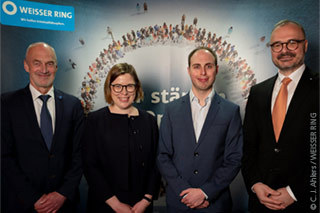How expensive is crime for the victims and for society? How much is it worthwhile for the state to invest in prevention and victim protection? These questions are not only the subject of public debate but also of Anna Bindler, professor at the Department of Law and Economics of the Faculty of Management, Economics and Social Sciences of the University of Cologne, has studied these questions. She has now been awarded the "Science Prize for Victim Protection" for her research work. The Weiße Ring, Germany's largest aid organisation for crime victims, awarded the prize together with the Bundeskriminalamt (Federal Criminal Police Office, BKA) for the first time in Mainz on Wednesday.
Together with her colleague Nadine Ketel, professor Bindler, had calculated what costs crime causes for individuals, as well as for society, based on Dutch data. "We looked at what happens before and after victimisation. Over time, we could see changes and see that labour market incomes decrease and dependency on social benefits increases," Anna Bindler explains. "To give an example here: Benefit dependency increases by over 40 per cent for women who are victims of domestic violence." On average, the effects on income and social benefits are still visible four years later.
The cost to the state when people become victims of crime is in the billions of dollars. "What we are showing is that the cost to individuals who are victims of crime is higher than we previously thought. When we think about compensation, about support programmes, that plays an important role." Some of the results of the research can certainly be transferred to Germany”, says professor Bindler. "I feel the award is a very great appreciation of our work and also a sign that we have really reached the people, the organisations and institutions we want to reach with our research work."
The Heidelberger PhD candidate David Grasmann could ensure the also first time given newcomer award. He focused on how the victim protection as well as the crime clearance rate by violent acts with surviving victims could be further improved through a closer collaboration between the police and forensic medicine in his master thesis.
"With the Science Award, the Weiße Ring wants to send a signal of how important independent research is for a functioning society”, emphasised Dr Patrick Liesching, Federal Chairman of the Weiße Ring. “We now hope that the findings of our award winners will find practical application so that victims of crime also benefit from good science."
